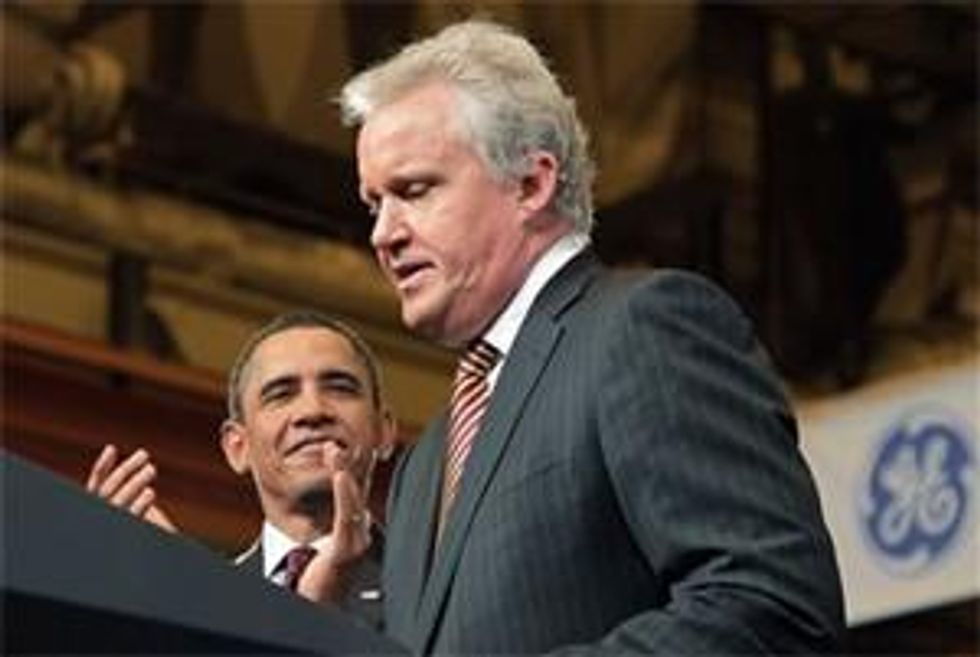If it had been revealed that Jeffrey Immelt once hired an undocumented nanny, or defaulted on his mortgage, he would be forced to resign as head of President Barack Obama's "Council on Jobs and Competitiveness." But the fact that General Electric, where Immelt is CEO, didn't pay taxes on its $14.5 billion profit last year--and indeed is asking for a $3.2 billion tax rebate--has not produced a word of criticism from the president, who in January praised Immelt as a business leader who "understands what it takes for America to compete in the global economy."
What it takes, evidently, is shifting profit and jobs abroad: Only one out of three GE workers is now based in the U.S., and almost two-thirds of the company's profit is sheltered in its foreign operations. Thanks to changes in the tax law engineered when another avowedly pro-business Democrat, Bill Clinton, was president, U.S. multinational financial companies can avoid taxes on their international scams. And financial scams are what GE excelled in for decades, when GE Capital, its financial unit, which specialized in credit card, consumer loan and housing mortgage debt, accounted for most of GE's profits.
That's right, GE, along with General Motors with its toxic GMAC financial unit, came to look more like an investment bank than a traditional industrial manufacturing giant that once propelled this economy and ultimately it ran into the same sort of difficulties as the Wall Street hustlers. As The New York Times' David Kocieniewski, who broke the GE profit story, put it: "Because its lending division, GE Capital, has provided more than half of the company's profit in some recent years, many Wall Street analysts view G.E. not as a manufacturer but as an unregulated lender that also makes dishwashers and M.R.I. machines."
Maximizing corporate profits at the taxpayer's expense is what top CEOs are good at, and after all it was Immelt who presided over GE when it got so heavily into the subprime mortgage business that it needed a government bailout to avoid bankruptcy. This was before Obama made him a trusted adviser.
Back at the end of 2008, Bloomberg reported that the U.S. government had agreed to insure an additional $139 billion in GE Capital's debt holdings, the second such intervention within a month, adding, "The company's exposure to the deepest financial crisis since the 1930s has cut its market value by more than half this year." A Washington Post expose titled "How a Loophole Benefits GE in Bank Rescue" documented the power of Immelt's lobbying operation in Washington. GE was not initially deemed eligible for the debt guarantee program offered to failing banks, "but regulators soon loosened the eligibility requirements, in part because of behind-the scenes appeals from GE." And it worked; as the Post reported, "The government's actions have been `powerful and helpful' to the company, GE chief executive Jeffrey Immelt acknowledged." For the next two years, GE would still report enormous profits without paying taxes, adding insult to the injury that financial shenanigans had inflicted on ordinary taxpayers who bailed the company out.
On Feb. 6, 2009, Immelt sent a contrite annual letter to GE shareholders, admitting, "Our Company's reputation was tarnished because we weren't the 'safe and reliable' growth company that is our aspiration." While conceding his own culpability in GE's downturn, Immelt predicted a rosy future: "I accept responsibility for this. But, I think the environment presents an opportunity of a lifetime."
Not, obviously, for the 50 million Americans who have either lost their homes or are deeply underwater in a housing market that is still in steep decline thanks to the lending practices of companies like GE Capital. Nope, the good times are in the offing only for corporations that know how to make the U.S. government a partner in their scams. As Immelt stated blatantly: "The global economy, and capitalism, will be `reset' in several important ways. The interaction between government and business will change forever. In a reset economy, the government will be a regulator; and also an industry policy champion, a financier, and a key partner."
That's the essential blueprint for Obama's restructuring of the economy, as the president put it in selecting Immelt to replace Paul Volcker as head of his outside team of economic advisers. Volcker had become increasingly critical of the corporate high rollers. Obama, although noting the suffering of ordinary Americans, clearly believes that such populism is now beside the point. As the president put it in announcing Immelt's appointment on Jan. 20, 2011: "The past two years was about moving our economy back from the brink. Our job now is putting our economy into overdrive."
But overdrive, with CEOs like Immelt shifting the gears, is what brought us so close to the brink. Once again Obama seems fatally addicted to the notion that the heavy hitters who got us into this mess are the very folks to be trusted to get us out of it. What he seems incapable of grasping is that while they are personally very good at avoiding the precipice, the rest of us are hardly passengers in their limos.
